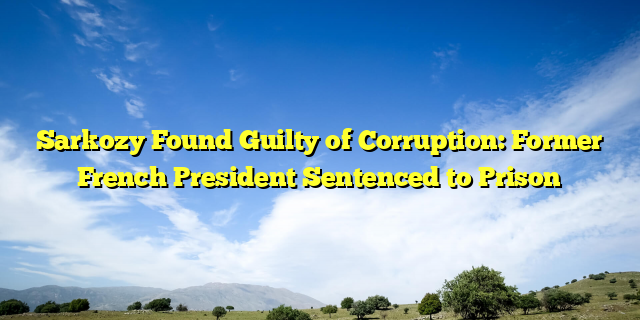The former French President Nicolas Sarkozy has been found guilty of corruption and influence peddling, marking a historic moment in French politics. The Paris court sentenced the 66-year-old to a one-year prison term, which he can request to serve under house arrest with an electronic monitoring bracelet. This verdict, delivered on Monday, is the first time a former French president has received a custodial sentence for corruption. While Sarkozy plans to appeal the decision, the conviction casts a long shadow over his legacy and future involvement in French politics.
A “Pact of Corruption”: The Details of the Case
The case revolves around Sarkozy’s attempts to bribe a magistrate, Gilbert Azibert, in exchange for confidential information regarding a separate legal investigation involving the former president. The court found a “pact of corruption” between Sarkozy, his longtime lawyer and friend Thierry Herzog, and Azibert. All three defendants received the same one-year prison sentence, with an additional two-year suspended sentence.
The prosecution’s case hinged on wiretapped phone conversations between Sarkozy and Herzog, conducted under the pseudonyms “Paul Bismuth.” These conversations revealed discussions about securing a prestigious position for Azibert in Monaco in return for leaking information about an investigation into Sarkozy’s 2007 presidential campaign financing.
Former French President Nicolas Sarkozy arrives at the Paris courtroom on March 1, 2021.
In one intercepted call, Sarkozy was heard saying, “I’ll make him move up…I’ll help him,” referring to Azibert. Another conversation documented Herzog reminding Sarkozy to “say a word” for Azibert during a trip to Monaco. Despite Azibert never receiving the promised position and the legal proceedings against Sarkozy in the related case being dropped, the court determined that the “clearly stated promise” constituted corruption under French law, regardless of whether it was ultimately fulfilled.
Sarkozy’s Defense and the Legal Arguments
Throughout the ten-day trial, Sarkozy vehemently denied any wrongdoing. He maintained that his offer to assist Azibert was merely an act of goodwill, consistent with his political career of “giving people a little help.” He argued that the wiretapped conversations, which violated the confidentiality between a lawyer and client, were the basis of a politically motivated “insane harassment.” His legal team contended that the conversations were simply “idle chatter” and did not represent a corrupt intent.
However, the court upheld the legality of the wiretaps, asserting their relevance in establishing evidence of corruption-related offenses. The judges underscored the gravity of the crimes, emphasizing that they were committed by a former president for personal gain. They further noted that Sarkozy, a trained lawyer, was fully aware of the illegality of his actions.
A Legacy Tarnished: The Implications of the Verdict
This conviction deals a significant blow to Sarkozy’s legacy and ongoing influence in French conservative politics. While he has withdrawn from active politics after failing to secure his party’s nomination for the 2017 presidential election, he remains a prominent figure behind the scenes. He maintains relationships with key political figures, including President Emmanuel Macron, and enjoys considerable popularity among conservative voters. The release of his memoirs last year, “The Time of Storms,” further cemented his presence in the public sphere.
Nicolas Sarkozy during his presidency in 2007.
Further Legal Battles Loom
The corruption conviction is not the end of Sarkozy’s legal woes. He faces another trial later this month concerning allegations of illegal campaign financing during his unsuccessful 2012 presidential bid. He and his conservative party are accused of using a fraudulent invoice system to conceal excessive spending. Additionally, an ongoing investigation dating back to 2013 alleges that Sarkozy accepted millions from the late Libyan dictator Muammar Gaddafi to illegally finance his 2007 campaign. Sarkozy has denied any wrongdoing in both cases.
A Watershed Moment for French Politics
The Sarkozy verdict represents a watershed moment for French politics, demonstrating that even former presidents are not above the law. The case has ignited debate about the integrity of the French legal system and the role of money and influence in politics. The outcome of Sarkozy’s appeal and the upcoming trials will undoubtedly shape the future landscape of French political life and continue to captivate public attention. The court’s decision sends a powerful message about accountability and the pursuit of justice, regardless of an individual’s political stature.
This conviction stands in contrast to the 2011 case of Jacques Chirac, Sarkozy’s predecessor, who received a suspended sentence for misuse of public funds during his tenure as mayor of Paris. The court distinguished Chirac’s case, which was not classified as a corruption offense, from Sarkozy’s conviction for actively engaging in corrupt practices. This distinction underscores the severity of the charges against Sarkozy and the court’s commitment to holding him accountable for his actions.
